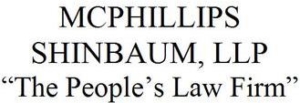Can An Employer Fire You for Filing a Complaint?
There’s a lot of incorrect information floating around the topic of at-will employment. There’s a common belief that at-will employment means that employees can be fired for anything at any time—which often makes employees with legitimate complaints stay quiet for fear of retaliation. As an Alabama employee, it’s important to know your rights and how to protect them.
If you think you’ve been targeted by your employer after making a formal complaint, you may have a legal case against them. Call McPhillips Shinbaum at 334-262-1911 to set up your free case evaluation now.
Employee Rights and Protections in Alabama
Employees in Alabama are protected by a number of state and federal laws. Legislators recognize that employees are often at a disadvantage in the workplace. Employers know that employees rely on their income and that threatening their income can force them to fall in line. Employees need legal protections since expecting employers to do the right thing is simply not a viable option.
While it’s true that Alabama is an at-will employment state, there are many legal protections that forbid employers from taking action against employees for specific reasons. For example, Title VII protects discrimination against employees based on national origin, sex, color, religion, and race.
Title VII also forbids employers from retaliating against employees who file complaints or cooperate with investigations. Additionally, employees over the age of 40 are protected from age-based discrimination. Other relevant pieces of legislation include the Americans With Disabilities Act, the Fair Labor Standards Act, and the Occupational Safety and Health Act.
Alabama has several state-specific laws protecting employees. The whistleblower protection statute protects employees from being fired when they refuse to obey an illegal order. Additionally, there’s a public policy exception to the state’s at-will employment law. This means that employees cannot be terminated if it would be against an established state public policy.
How Employers May Retaliate
There are numerous ways employers may retaliate when an employee files a complaint. Obviously, termination is a common outcome. Employers may explain away your termination with flimsy complaints about your performance or claim that they are simply downsizing. They may also demote you, which often comes with a significant reduction in pay and a major hit to your reputation at work.
Employers may reduce an employee’s hours or pay; similarly, they may swap your hours to less favorable hours. For example, an employee who has long worked 9:00 A.M. to 5:00 P.M. may suddenly find themselves scheduled for overnight shifts. Other forms of retaliation include negative work evaluations and attempts to create an uncomfortable or hostile work environment.
Proving Retaliation
To take action against an employer that is retaliating against you, you must be able to prove that their actions were retaliation. Consider these steps:
- Document everything: The more evidence you have to back up your claims, the harder it will be for your employer to claim that they were simply taking action against your poor work. From the moment you file your complaint, write down every interaction you have that indicates you may be a victim of retaliation. Additionally, whenever you communicate with your employer and they appear to be going against the policy, ask them to provide their instructions in writing. Verbal conversations are far harder to prove.
- Know your company’s policies: Know your company’s policies to the letter. This allows you to document when your superiors are going against company policy or ordering you to do so.
- Recognize your allies: If there are coworkers or others at your work who have seen your employer take action against you, know who you can rely on. Your attorney may be able to talk to them and use their testimony as evidence in your case.
- Talk to an employment attorney: An employment attorney can help you hold your employer accountable and fight for fair treatment.
Start Your Case Now with McPhillips Shinbaum
The sooner you begin working with the team at McPhillips Shinbaum, the sooner we can fight for justice in your employment case. Call our team at 334-262-1911 or send us a message online to set up a consultation now.










